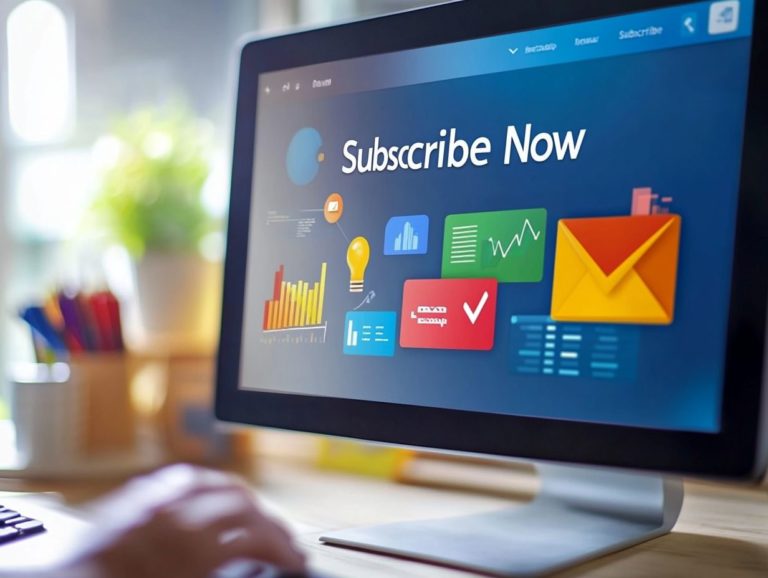Building an Email Marketing Calendar
Let's Set Up Your Lead Generation Strategy
Fill out the form below, and our team will get in touch with you to create a tailored solution for your business.
Email marketing stands as one of the most formidable tools in your marketing arsenal. Yet, it s surprising how many people underestimate the significance of a well-planned email marketing calendar.
A structured approach not only streamlines your efforts but also amplifies engagement and drives impressive results. This article delves into the myriad benefits of planning ahead, guides you on how to create a solid strategy, and outlines the essential elements of an effective email marketing calendar.
From choosing the ideal platform to evaluating your success, you ll uncover ways to elevate your email campaigns and achieve your marketing objectives with finesse.
Contents
- Key Takeaways:
- The Importance of an Email Marketing Calendar
- Creating a Strategy for Your Email Marketing Calendar
- Let's Set Up Your Lead Generation Strategy
- Defining Your Target Audience
- Choosing the Right Email Marketing Platform
- Planning Your Content
- Let's Set Up Your Lead Generation Strategy
- Implementing and Managing Your Email Marketing Calendar
- Let's Set Up Your Lead Generation Strategy
- Measuring Success and Making Adjustments
- Frequently Asked Questions
- Let's Set Up Your Lead Generation Strategy
Key Takeaways:

- Stay organized and save time by planning ahead with an email marketing calendar.
- Define your goals, target audience, and choose the right email marketing platform for effective email campaigns.
- Plan a variety of email types and track key metrics to measure success and make necessary adjustments.
The Importance of an Email Marketing Calendar
An email marketing calendar is a critical tool for organizing email campaigns, streamlining your marketing efforts, and ensuring that your communications align with your campaign goals.
This structured approach elevates customer engagement, maintains consistency in your messaging, and strategically times your email sends for optimal audience targeting.
Such planning aids in effective list segmentation and maximizes the impact of your email content. In the ever-evolving landscape of digital marketing, this meticulous planning significantly contributes to a successful email marketing strategy.
Benefits of Planning Ahead
Planning ahead in your email marketing strategy opens the door to a wealth of benefits, such as elevated email content quality, improved campaign performance, and refined automation capabilities.
By dedicating time to strategize, you can craft high-quality email newsletters that resonate with your audience, ensuring that each message is visually captivating and packed with valuable content. This foresight enables you to better target audience segments, resulting in personalized communications that drive engagement.
When you implement automated campaigns, you can maintain effective follow-ups without constant manual effort. A well-prepared approach aligns your campaigns closely with audience needs, ultimately leading to higher conversion rates and stronger connections.
Creating a Strategy for Your Email Marketing Calendar
Crafting a compelling strategy for your email marketing calendar requires a profound understanding of your marketing objectives. You need a well-defined email strategy and targeted audience engagement techniques that resonate with your specific audience segments.
Setting Goals and Objectives
Setting clear campaign goals and objectives is essential for measuring the effectiveness of your email marketing efforts and ensuring they align seamlessly with your broader marketing strategy.
These goals can include boosting subscriber engagement, increasing conversion rates, enhancing brand awareness, and driving traffic to your website. By tailoring your emails to these specific aims, you create more personalized content that resonates with your audience.
Tracking performance metrics, such as open rates, click-through rates, and conversion levels, becomes crucial in evaluating your success. This process refines your strategies and helps you understand which aspects of the campaign genuinely engage recipients. Ultimately, this leads to improved overall performance in your email marketing endeavors.
Don t miss out on the chance to elevate your email campaigns! Start planning your email marketing calendar today.
Let's Set Up Your Lead Generation Strategy
Fill out the form below, and our team will get in touch with you to create a tailored solution for your business.
Defining Your Target Audience

Defining your target audience is a crucial step in email marketing. This allows you to effectively target your audience by dividing them into smaller groups based on demographics, behaviors, and preferences.
This process enhances engagement and is essential for customer retention strategies. By segmenting your audience, you can tailor your messages to address the unique needs and interests of each group.
For instance, campaigns focused on user activity can significantly boost loyalty and reduce churn rates. Understanding your audience enables personalized communication, fostering a deeper connection.
Successful campaigns often depend on precise targeting, which elevates customer satisfaction and drives overall business growth.
Choosing the Right Email Marketing Platform
Selecting the ideal email marketing platform is crucial for a successful email strategy. It impacts your workflow, influences email design, enhances automation capabilities, and shapes your overall campaign management.
Making the right choice sets the foundation for your email marketing success.
Key Features and Considerations
When choosing an email marketing platform, evaluate key features such as customizable email templates, tracking usability, and overall functionality to ensure it meets your marketing needs.
The right tool should provide an intuitive design interface, allowing you to create visually appealing emails without requiring extensive technical skills. You should be able to customize templates to reflect your brand identity, ensuring consistency across all communications.
Equally important is the robustness of tracking capabilities, enabling you to effectively monitor engagement metrics like open rates and click-through rates.
With these powerful features, you can enhance your outreach strategies and refine campaigns based on data-driven insights, resulting in improved overall performance.
Planning Your Content
Effective content planning for your email campaigns is crucial for crafting engaging promotional emails and newsletters that resonate with your audience.
Aligning these communications with your overall marketing strategy ensures a cohesive and impactful approach that captures attention and drives results.
Types of Emails to Include
In your email content planning, pinpoint the various types of emails you need, such as promotional emails, newsletters, and automatic emails. Each format serves a distinct purpose, significantly enhancing the effectiveness of your marketing strategy.
Promotional emails are perfect for driving sales through limited-time offers or seasonal discounts. They create a sense of urgency that prompts recipients to take swift action.
Let's Set Up Your Lead Generation Strategy
Fill out the form below, and our team will get in touch with you to create a tailored solution for your business.
Email newsletters nurture lasting relationships with customers by delivering valuable insights, updates, and content that resonates with their interests.
Automatic emails allow for personalized communication, enabling you to re-engage users based on their behaviors, such as cart abandonment or previous interactions. Each type of email is a powerful tool that drives customer engagement and boosts your sales!
Creating a Content Schedule

Creating a strong content plan is crucial for ensuring your email sends are timely and relevant. This alignment allows your marketing team to work seamlessly with the broader marketing schedule and objectives.
By establishing a well-structured plan, you can focus on targeted messaging that resonates with your audience, ultimately boosting engagement and conversion rates.
Utilizing tools like Trello, Asana, and Google Calendar becomes invaluable for organizing and visualizing content timelines. These tools facilitate effortless collaboration and updates among team members.
The significance of timing in email marketing can t be overstated. Sending emails on optimal days and at the right hours can enhance open rates and reader interaction.
Incorporating analytics tools into your strategy can fine-tune these timings, ensuring your approach remains effective and adaptable in a dynamic landscape.
Implementing and Managing Your Email Marketing Calendar
To implement and manage your email marketing calendar effectively, execute your planned email campaigns with precision. Leverage automation tools to streamline your efforts and adhere to the best practices in marketing communications.
This meticulous approach not only enhances your marketing strategy but also ensures your messages reach your audience with maximum impact.
Best Practices for Execution
Adopting best practices for execution is essential for achieving optimal email engagement and enhancing the overall effectiveness of your email campaign strategy.
To elevate engagement, prioritize personalizing content, segmenting your audience, and crafting compelling subject lines that grab attention.
Utilizing A/B testing which compares two versions of an email to see which performs better can be a game-changer. It helps you discover what resonates with your recipients and ensures each campaign is fine-tuned based on genuine feedback.
Incorporating interactive elements and clear calls-to-action encourages your audience to take the desired steps. It’s also important to monitor metrics like bounce rates and unsubscribe rates, as they can uncover potential issues in your targeting or messaging.
Don’t overlook the importance of analyzing performance metrics post-campaign. Examining open rates, click-through rates, and conversion metrics offers invaluable insights into what works and what doesn t. This empowers you to sharpen your email strategies and drive more success!
Let's Set Up Your Lead Generation Strategy
Fill out the form below, and our team will get in touch with you to create a tailored solution for your business.
Measuring Success and Making Adjustments
To measure the success of your email marketing efforts, track results using key performance metrics. This data-driven approach allows you to fine-tune your strategies based on thorough analysis and effective email testing.
Consistently monitoring these performance metrics enables you to identify trends and patterns that will inform your future strategies, which helps you craft tailored campaigns that resonate deeply with your audience.
Key Metrics to Track
Tracking key metrics such as email open rates and engagement rates is essential for evaluating the effectiveness of your email marketing campaigns.
Understanding these metrics offers invaluable insights into how your recipients interact with your content. Open rates can shed light on the effectiveness of your subject lines, while engagement rates which include click-through rates and conversions reveal how compelling your email content truly is.
It’s crucial to keep an eye on metrics like bounce rates and unsubscribe rates to identify potential issues in your targeting or messaging.
Frequently Asked Questions

What is an email marketing calendar?
An email marketing calendar is a schedule or plan that outlines the dates and times of your email marketing campaigns. It helps you organize and strategize your email communications to your target audience.
Why is an email marketing calendar important?
An email marketing calendar is essential for planning and scheduling campaigns ahead of time. This ensures consistency and eliminates last-minute rushes.
How do I start building an email marketing calendar?
First, decide what you want to achieve with your marketing and identify your target audience. Next, set the frequency for your emails and the types of content you will send.
Choose the dates and times for each campaign. Finally, use a calendar tool or spreadsheet to layout your plan.
What should I include in my email marketing calendar?
Make sure your calendar highlights key dates, such as:
- Holidays
- Promotions
Include the type of email, such as:
- Newsletter
- Promotional
- Transactional
Additionally, note the subject line, target audience, and call to action for each campaign.
How often should I update my email marketing calendar?
Review and update your email marketing calendar regularly. This keeps it aligned with your marketing goals and any business changes.
Add new campaigns and remove old ones to keep your calendar organized and current.
Let's Set Up Your Lead Generation Strategy
Fill out the form below, and our team will get in touch with you to create a tailored solution for your business.
Are there any tools or resources to help with building an email marketing calendar?
Yes! Many tools and resources can assist you, including:
- Email marketing platforms
- Calendar templates
- Scheduling tools
These resources streamline the process and make it easier to track and manage your email campaigns.
Start building your email marketing calendar today! It’s your roadmap to success.






